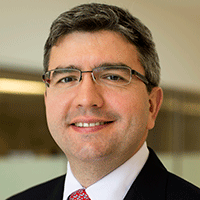
Bogdan I. Epureanu is an Arthur F. Thurnau Professor in the Department of Mechanical Engineering and has a courtesy appointment in the Department of Electrical Engineering and Computer Science. In 1999, he received his Ph.D. from Duke University in Mechanical Engineering and Materials Science with a focus on Nonlinear Dynamics. During his tenure at the University of Michigan, since 2002, he served as associate chair of the division of Integrative Systems and Design, associate director of the U.S. Army Automotive Research Center (ARC), and was founding Program Director of the Systems Engineering and Design Master Program. His research interests include nonlinear dynamics of complex systems, particularly those with behaviors leading to catastrophes. He focuses on understanding dynamic phenomena in teaming of autonomous vehicles, enhanced aircraft safety and performance, early detection of neurodegenerative diseases, and forecasting tipping points in disease epidemics and ecology. This research includes collaborations across interdisciplinary teams and large consortia, such as government (NIH, NSF, DOE, DoD), industry (Pratt & Whitney, GE, Airbus), academia. He has published over 350 articles in journals, conferences, and books.
In his role as the Director of the U.S. Army Automotive Research Center (ARC), he applies his research leadership to envision and realize the future of the U.S. military autonomous vehicles. He leads the ARC as a hub where new ideas are generated and translated into key technologies in several areas of autonomy of ground systems, including vehicle dynamics, control, autonomous behavior, human-autonomy teaming, high performance structures and materials, intelligent power systems, and fleet operations and vehicle system of systems integration. Such systems resonate with his background, which is in nonlinear dynamics, an area of research that helps us understand, model, and predict unique phenomena in complex systems, both engineered and natural.